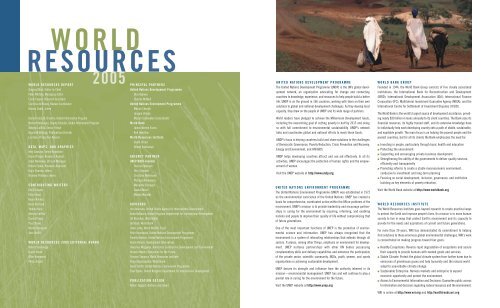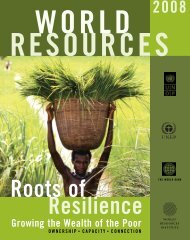jp8589 WRI.qxd - World Resources Institute
jp8589 WRI.qxd - World Resources Institute
jp8589 WRI.qxd - World Resources Institute
You also want an ePaper? Increase the reach of your titles
YUMPU automatically turns print PDFs into web optimized ePapers that Google loves.
WORLD<br />
RESOURCES<br />
2<br />
WORLD RESOURCES REPORT<br />
Gregory Mock, Editor-in-Chief<br />
Peter Whitten, Managing Editor<br />
Emily Cooper, Research Assistant<br />
Carolina de Rosas, Review Coordinator<br />
Dennis Gadel, Intern<br />
Daniel Tunstall, Director, Global Information Program<br />
Norbert Henninger, Deputy Director, Global Information Program<br />
Antonio LaViña, Senior Fellow<br />
Hyacinth Billings, Publications Director<br />
Lori Han, Production Advisor<br />
DATA, MAPS, AND GRAPHICS<br />
Amy Cassara, Senior Associate<br />
Daniel Prager, Research Analyst<br />
Janet Nackoney, GIS Lab Manager<br />
Robert Soden, Research Assistant<br />
Rajiv Sharma, Intern<br />
Brianna Peterson, Intern<br />
CONTRIBUTING <strong>WRI</strong>TERS<br />
Emily Cooper<br />
Polly Ghazi<br />
Karen Holmes<br />
Karin Krchnak<br />
Yumiko Kura<br />
Antonio LaViña<br />
Daniel Prager<br />
Paul Steele<br />
Wendy Vanasselt<br />
John Virdin<br />
WORLD RESOURCES 2005 EDITORIAL BOARD<br />
Robert SanGeorge<br />
David Jhirad<br />
Allen Hammond<br />
Philip Angell<br />
2005<br />
PRINCIPAL PARTNERS<br />
United Nations Development Programme<br />
Olav Kjørven<br />
Charles McNeill<br />
United Nations Environment Programme<br />
Marion Cheatle<br />
Jacquie Chenje<br />
Mirjam Schomaker (consultant)<br />
<strong>World</strong> Bank<br />
James Warren Evans<br />
Kirk Hamilton<br />
<strong>World</strong> <strong>Resources</strong> <strong>Institute</strong><br />
David Jhirad<br />
Robert SanGeorge<br />
ADJUNCT PARTNER<br />
UNEP/GRID-Arendal<br />
Steinar Sørensen<br />
Otto Simonett<br />
Christian Nellemann<br />
Philippe Rekacewicz<br />
Marianne Fernagut<br />
Luana Karvel<br />
Morten Wasstøl<br />
ADVISORS<br />
Jon Anderson, United States Agency for International Development<br />
Anna Ballance, United Kingdom Department for International Development<br />
Jill Blockhus, <strong>World</strong> Bank<br />
Jan Bojö, <strong>World</strong> Bank<br />
Owen Cylke, <strong>World</strong> Wildlife Fund<br />
Peter Hazelwood, United Nations Development Programme<br />
Timothy Kasten, United Nations Environment Programme<br />
Ashok Khosla, Development Alternatives<br />
Onesmus Mugyenyi, Advocates Coalition for Development and Environment<br />
Urvashi Narain, <strong>Resources</strong> for the Future<br />
Frances Seymour, <strong>World</strong> <strong>Resources</strong> <strong>Institute</strong><br />
Priya Shyamsundar, <strong>World</strong> Bank<br />
David Smith, United Nations Environment Programme<br />
Paul Steele, United Kingdom Department for International Development<br />
PUBLICATION DESIGN<br />
Alston Taggart, Barbieri and Green<br />
UNITED NATIONS DEVELOPMENT PROGRAMME<br />
The United Nations Development Programme (UNDP) is the UN’s global development<br />
network, an organization advocating for change and connecting<br />
countries to knowledge, experience, and resources to help people build a better<br />
life. UNDP is on the ground in 166 countries, working with them on their own<br />
solutions to global and national development challenges. As they develop local<br />
capacity, they draw on the people of UNDP and its wide range of partners.<br />
<strong>World</strong> leaders have pledged to achieve the Millennium Development Goals,<br />
including the overarching goal of cutting poverty in half by 2015 and doing<br />
so with full commitment to environmental sustainability. UNDP’s network<br />
links and coordinates global and national efforts to reach these Goals.<br />
UNDP’s focus is helping countries build and share solutions to the challenges<br />
of Democratic Governance, Poverty Reduction, Crisis Prevention and Recovery,<br />
Energy and Environment, and HIV/AIDS.<br />
UNDP helps developing countries attract and use aid effectively. In all its<br />
activities, UNDP encourages the protection of human rights and the empowerment<br />
of women.<br />
Visit the UNDP website at http://www.undp.org<br />
UNITED NATIONS ENVIRONMENT PROGRAMME<br />
The United Nations Environment Programme (UNEP) was established in 1972<br />
as the environmental conscience of the United Nations. UNEP has created a<br />
basis for comprehensive, coordinated action within the UN on problems of the<br />
environment. UNEP’s mission is to provide leadership and encourage partnerships<br />
in caring for the environment by inspiring, informing, and enabling<br />
nations and people to improve their quality of life without compromising that<br />
of future generations.<br />
One of the most important functions of UNEP is the promotion of environmental<br />
science and information. UNEP has always recognized that the<br />
environment is a system of interacting relationships that extends through all<br />
sectors. It places, among other things, emphasis on environment for development.<br />
UNEP nurtures partnerships with other UN bodies possessing<br />
complementary skills and delivery capabilities and enhances the participation<br />
of the private sector, scientific community, NGOs, youth, women, and sports<br />
organizations in achieving sustainable development.<br />
UNEP derives its strength and influence from the authority inherent in its<br />
mission—environmental management. UNEP has and will continue to play a<br />
pivotal role in caring for the environment for the future.<br />
Visit the UNEP website at http://www.unep.org<br />
WORLD BANK GROUP<br />
Founded in 1944, the <strong>World</strong> Bank Group consists of five closely associated<br />
institutions: the International Bank for Reconstruction and Development<br />
(IBRD); International Development Association (IDA); International Finance<br />
Corporation (IFC); Multilateral Investment Guarantee Agency (MIGA); and the<br />
International Centre for Settlement of Investment Disputes (ICSID).<br />
The <strong>World</strong> Bank is the world’s largest source of development assistance, providing<br />
nearly $30 billion in loans annually to its client countries. The Bank uses its<br />
financial resources, its highly trained staff, and its extensive knowledge base<br />
to individually help each developing country onto a path of stable, sustainable,<br />
and equitable growth. The main focus is on helping the poorest people and the<br />
poorest countries, but for all its clients the Bank emphasizes the need for:<br />
■ Investing in people, particularly through basic health and education<br />
■ Protecting the environment<br />
■ Supporting and encouraging private business development<br />
■ Strengthening the ability of the governments to deliver quality services,<br />
efficiently and transparently<br />
■ Promoting reforms to create a stable macroeconomic environment,<br />
conducive to investment and long-term planning<br />
■ Focusing on social development, inclusion, governance, and institution<br />
building as key elements of poverty reduction.<br />
Visit the <strong>World</strong> Bank website at http://www.worldbank.org<br />
WORLD RESOURCES INSTITUTE<br />
The <strong>World</strong> <strong>Resources</strong> <strong>Institute</strong> goes beyond research to create practical ways<br />
to protect the Earth and improve people’s lives. Its mission is to move human<br />
society to live in ways that protect Earth’s environment and its capacity to<br />
provide for the needs and aspirations of current and future generations.<br />
For more than 20 years, <strong>WRI</strong> has demonstrated its commitment to helping<br />
find solutions to these enormous global environmental challenges. <strong>WRI</strong>’s work<br />
is concentrated on making progress toward four goals:<br />
■ Healthy Ecosystems: Reverse rapid degradation of ecosystems and assure<br />
their capacity to provide humans with needed goods and services.<br />
■ Stable Climate: Protect the global climate system from further harm due to<br />
emissions of greenhouse gases and help humanity and the natural world<br />
adapt to unavoidable climate change.<br />
■ Sustainable Enterprise: Harness markets and enterprise to expand<br />
economic opportunity and protect the environment.<br />
■ Access to Environmental Information and Decisions: Guarantee public access<br />
to information and decisions regarding natural resources and the environment.<br />
<strong>WRI</strong> is online at http://www.wri.org and http://earthtrends.wri.org

















